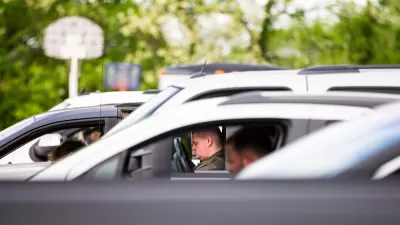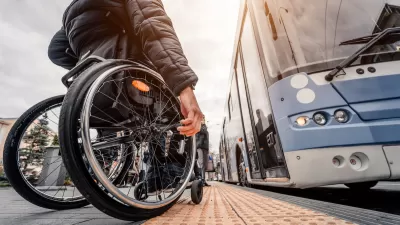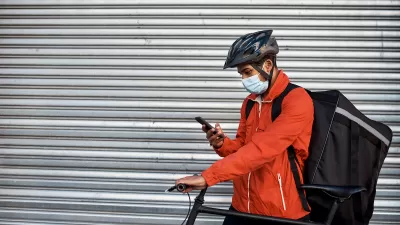People who are physically unable to drive can benefit from effective public transit systems and accessible, mixed-use neighborhoods.

The car-centric infrastructure that dominates most U.S. cities makes navigating the public realm more difficult for many groups, including people with disabilities.
As Matthew Rozsa explains in a piece on Salon, “there is a crucial difference between not driving for economic or ecological reasons — or, in extreme cases, due to legal consequences for crimes like driving while intoxicated — and not driving because your body makes the task physically impossible. In the latter scenario, being unable to drive isn't merely an inconvenience. It becomes another manifestation of a person's disability, and a particularly debilitating one at that.”
Zoe Gross, director of advocacy at the nonprofit Autistic Self Advocacy Network, told Salon in an email that “not being able to drive can significantly worsen a person's life, especially if they live in an area of the country with little or no public transportation.”
People who are unable to drive, regardless of their ability, can face discrimination in employment, education, healthcare, and other important areas. Advocates say supporting people with disabilities involves building robust public transportation systems and putting a stronger focus on accessibility in infrastructure and mobility projects.
FULL STORY: The hidden ways our car-obsessed culture is especially hard on disabled people

Planetizen Federal Action Tracker
A weekly monitor of how Trump’s orders and actions are impacting planners and planning in America.

Congressman Proposes Bill to Rename DC Metro “Trump Train”
The Make Autorail Great Again Act would withhold federal funding to the system until the Washington Metropolitan Area Transit Authority (WMATA), rebrands as the Washington Metropolitan Authority for Greater Access (WMAGA).

The Simple Legislative Tool Transforming Vacant Downtowns
In California, Michigan and Georgia, an easy win is bringing dollars — and delight — back to city centers.

The States Losing Rural Delivery Rooms at an Alarming Pace
In some states, as few as 9% of rural hospitals still deliver babies. As a result, rising pre-term births, no adequate pre-term care and harrowing close calls are a growing reality.

The Small South Asian Republic Going all in on EVs
Thanks to one simple policy change less than five years ago, 65% of new cars in this Himalayan country are now electric.

DC Backpedals on Bike Lane Protection, Swaps Barriers for Paint
Citing aesthetic concerns, the city is removing the concrete barriers and flexposts that once separated Arizona Avenue cyclists from motor vehicles.
Urban Design for Planners 1: Software Tools
This six-course series explores essential urban design concepts using open source software and equips planners with the tools they need to participate fully in the urban design process.
Planning for Universal Design
Learn the tools for implementing Universal Design in planning regulations.
Smith Gee Studio
City of Charlotte
City of Camden Redevelopment Agency
City of Astoria
Transportation Research & Education Center (TREC) at Portland State University
US High Speed Rail Association
City of Camden Redevelopment Agency
Municipality of Princeton (NJ)





























